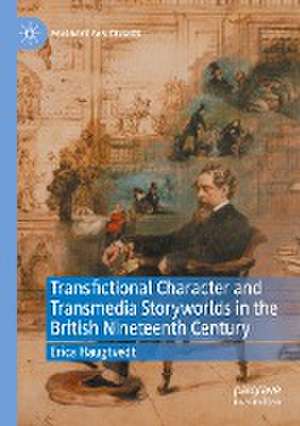Transfictional Character and Transmedia Storyworlds in the British Nineteenth Century: Palgrave Fan Studies
Autor Erica Haugtvedten Limba Engleză Paperback – 18 noi 2023
| Toate formatele și edițiile | Preț | Express |
|---|---|---|
| Paperback (1) | 721.95 lei 43-57 zile | |
| Springer International Publishing – 18 noi 2023 | 721.95 lei 43-57 zile | |
| Hardback (1) | 727.00 lei 43-57 zile | |
| Springer International Publishing – 18 noi 2022 | 727.00 lei 43-57 zile |
Preț: 721.95 lei
Preț vechi: 880.43 lei
-18% Nou
Puncte Express: 1083
Preț estimativ în valută:
138.19€ • 150.15$ • 116.15£
138.19€ • 150.15$ • 116.15£
Carte tipărită la comandă
Livrare economică 21 aprilie-05 mai
Preluare comenzi: 021 569.72.76
Specificații
ISBN-13: 9783031134654
ISBN-10: 3031134656
Ilustrații: XIII, 217 p. 3 illus.
Dimensiuni: 148 x 210 mm
Greutate: 0.28 kg
Ediția:1st ed. 2022
Editura: Springer International Publishing
Colecția Palgrave Macmillan
Seria Palgrave Fan Studies
Locul publicării:Cham, Switzerland
ISBN-10: 3031134656
Ilustrații: XIII, 217 p. 3 illus.
Dimensiuni: 148 x 210 mm
Greutate: 0.28 kg
Ediția:1st ed. 2022
Editura: Springer International Publishing
Colecția Palgrave Macmillan
Seria Palgrave Fan Studies
Locul publicării:Cham, Switzerland
Cuprins
1. Introduction: From Novel Studies to Fan Studies.- 2. Pickwick Abroad (1837–1838): Transfictional Character as
Permanent Object .- 3. Jack Sh Sheppard (1839–1840): Class and Complex Transfictional Character.- 4. Trilby (1894) in the Marketplace: fin de siècle Merchandising and Transfictional Character as Branded Object.- 5. Sherlock Holmes (1887–1930) and Believing in Character.- 6. Afterword.
Permanent Object .- 3. Jack Sh Sheppard (1839–1840): Class and Complex Transfictional Character.- 4. Trilby (1894) in the Marketplace: fin de siècle Merchandising and Transfictional Character as Branded Object.- 5. Sherlock Holmes (1887–1930) and Believing in Character.- 6. Afterword.
Notă biografică
Erica Haugtvedt is Assistant Professor of English in the Humanities Department at South Dakota Mines in Rapid City, South Dakota, USA. She specializes in nineteenth-century British literature, media and advertising history, and popular culture. She received her PhD in English from Ohio State University in 2015. She works on the serial Victorian novel and its contemporaneous adaptations—particularly focusing on serial character across media. Her articles have appeared in Victorian Studies, Victorian Periodicals Review, Transformative Works and Cultures, and Victorian Popular Fictions Journal.
Textul de pe ultima copertă
Transfictional Character and Transmedia Storyworlds in the British Nineteenth Century is an exciting and long-overdue application of fan studies to the 19th century literary world. Haugtvedt shows how the mass storytelling culture developed by the early Victorians resulted in the transmedia extensions of popular novels via penny press plagiarisms, printed illustrations, retellings in song, tie-in marketing and costuming, and cheap theatrical adaptations, and argues that these practices anticipate and are usefully compared to fandom practices of the 20th and 21st centuries. This book bridges an important gap in the field between more overtly folk practices and modern media fandom: for once, Sherlock Holmes is the end, not the start, of the story.”
–Francesca Coppa, Ph.D., Muhlenberg College, USA.
Erica Haugtvedt is Assistant Professor of English in the Humanities Department at South Dakota Mines in Rapid City, South Dakota, USA. She specializes in nineteenth-century British literature, media and advertising history, and popular culture. She received her PhD in English from Ohio State University in 2015. She works on the serial Victorian novel and its contemporaneous adaptations—particularly focusing on serial character across media. Her articles have appeared in Victorian Studies, Victorian Periodicals Review, Transformative Works and Cultures, and Victorian Popular Fictions Journal.
Caracteristici
Studies the emergence of transfictional and transmedia storytelling in the nineteenth century Contributes to fan studies, transmedia studies, and nineteenth century periodical studies Interrogates the nature of fictional character



